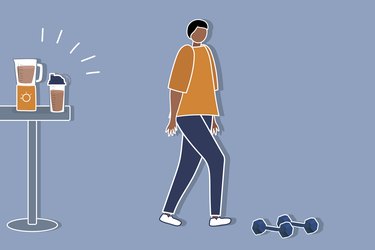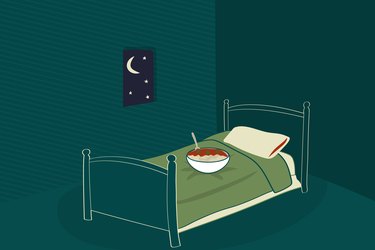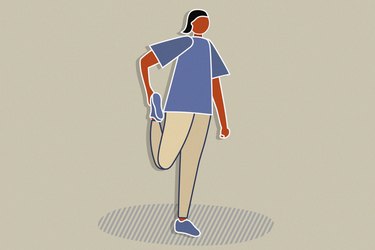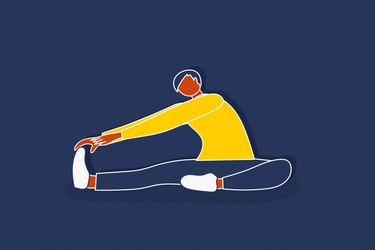
You've probably heard that it's important to eat protein shortly after working out for muscle repair and recovery. But whether you're swinging by the gym en route to work or heading out for a run in between Zoom calls, there's not always time for post-exercise grub.
Not to mention, physical activity releases the appetite-suppressing hormone leptin, while decreasing levels of ghrelin (a hormone that makes you hungry), according to a September 2018 study in Nutrients. So you might not even be in the mood for food right after a sweat session.
Video of the Day
But are you doing yourself a disservice if you don't replenish with protein? It turns out this is a hot area of research in the world of exercise science, and the latest findings may surprise you.
Why Your Muscles Need Protein
Protein is part of a healthy diet — and if you're physically active, it's even more crucial to eat an ample supply.
"Proteins are essential molecules, made of amino acids, which are found throughout the body," says Elizabeth Klingbeil, PhD, RDN, assistant professor of nutrition at Johnson & Wales University. Essentially, amino acids are the building blocks of protein.
"When you exercise, you make microscopic tears in your muscle fibers that need to be repaired," Klingbeil says. "Your body uses amino acids to create muscle cells, called myofibrils, which attach to the damaged muscles and not only heal the tiny tears, but also increase the muscle size and overall amount of muscle tissue."
So in order to keep your muscles healthy and toned, your body needs adequate protein to draw amino acids from.
The Best Time to Eat Protein
For years, the recommendation was to chow down as soon after working out as possible to kickstart muscle building and repair. "But recent research shows that your total daily protein intake matters more than when you eat," says Kacie Vavrek, RD, LN, a sports dietitian at the Ohio State University Wexner Medical Center.
"As long as you're meeting your protein needs for the day, you should be OK."
"There might be some situations where high-level athletes want to be specific about the timing of their protein intake, but for the average population, it is not the most important factor."
The anabolic (or muscle-building) effect of exercise lasts at least 24 hours post-workout, according to a June 2017 review in the Journal of the International Society for Sports Nutrition (JISSN). In light of this discovery, the optimal time period to eat protein is a personal preference.
"There might be some situations where high-level athletes want to be specific about the timing of their protein intake, but for the average population, it is not the most important factor," Klingbeil says. However, she points out that eating large amounts of protein immediately before exercise may affect performance due to GI discomfort.
That said, the JISSN review also suggests that the anabolic effect likely diminishes over time. In other words, even though you have all day to refuel with protein in order to stay strong and defined, you might get more bang for your buck if you dig into that chicken wrap sooner rather than later — within three hours after exercise, according to the review.
And because your body is primed for muscle building throughout the day after you work out, you should spread out your protein intake, so that you are incorporating it into every meal and snack. "That way, you will nourish and grow your muscles all day long," Vavrek says.
The JISSN review urges people not to go longer than 3 to 4 hours without eating protein.
How Much Protein Should You Eat?
It depends on your workout routine and fitness goals. "Resistance training usually results in an increased protein need to repair and rebuild muscles compared to endurance or cardiovascular training," Klingbeil says.
"And because protein promotes fullness, people who are trying to lose weight may need to eat more protein to decrease hunger and ensure that they do not lose muscle mass." Protein helps you hone a toned body while still burning fat.
The JISSN review states that people who work out should have between 1.4 to 2 grams of protein per 2.2 pounds of body weight a day, and around 0.25 grams per 2.2 pounds of body weight, or 20 to 40 grams of protein, per meal.
Here's another way to look at it: "Protein should make up 10 to 35 percent of your total daily calorie intake," Klingbeil says. "Therefore, there is a lot of freedom for individuals to increase their protein intake while still following the recommendations."
What Happens if You Don’t Eat Enough Protein?
For one thing, you're cheating yourself out of some of the benefits of exercise "When you skimp on protein, you are at higher risk of losing muscle mass," Vavrek says. "Your body starts to break down your muscles into amino acids to use for energy."
But that's not all: "Long-term protein deficiency, even with adequate calorie intake, can result in edema, brittle hair and nails, aching muscles and joints and weakened immune response," Klingbeil says. In fact, more than one in three Americans aged 50 and older don't get enough protein, per a February 2019 study in the Journal of Nutrition, Health & Aging.
Also, keep in mind that not all protein is created equal. "High-quality protein, also known as complete protein, contains all nine of the essential amino acids, whereas incomplete proteins are missing at least one amino acid," Klingbeil says.
High-quality proteins are found mainly in animal products, like dairy, eggs, meat, poultry and yogurt. On the other hand, most plant-based proteins — like seeds, nuts and beans — are incomplete. But you can easily combine low-quality proteins to make it complete, according to the University of Massachusetts. Think: Peanut butter on whole-wheat bread, rice and beans or split pea soup with a corn muffin.
As long as you're eating a balanced and varied diet that includes protein at every meal, chances are you are getting in all your amino acids.
Tip
For the best results, have some carbs with your protein. “Carbs are just as critical, especially after a hard workout,” Vavrek says. “They spike your blood pressure and insulin, which helps draw protein into the muscles.” And replacing the stored carbs you burned through during exercise will ensure you have plenty of energy for the rest of the day.
So, Is Skipping Protein After a Workout Really That Bad?
Assuming you eat a protein-rich diet throughout the day, skipping protein right after your workout is OK. What counts the most is the amount of protein you take in during the day as a whole — not so much when you eat it.
"As long as you are getting enough protein throughout the day, skipping it after a workout isn't going to stop any of the benefits you get from exercising," Klingbeil says. "You will still be able to lose weight and increase muscle mass and strength."
- Nutrients: "Acute and Chronic Effects of Exercise on Appetite, Energy Intake, and Appetite-Related Hormones: The Modulating Effect of Adiposity, Sex, and Habitual Physical Activity"
- Johns Hopkins Medicine: "PROTEIN CONTENT OF COMMON FOODS"
- Journal of the International Society of Sports Nutrition: "The effect of protein timing on muscle strength and hypertrophy: a meta-analysis"
- JISSN: "International Society of Sports Nutrition Position Stand: protein and exercise"
- University of Massachusetts: "Incomplete Proteins"
- The journal of Nutrition, Health & Aging: "Low Dietary Protein Intakes and Associated Dietary Patterns and Functional Limitations in an Aging Population: A NHANES Analysis"



